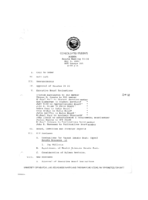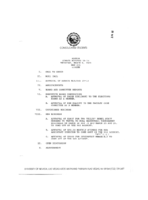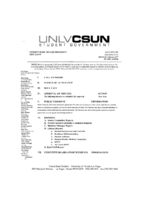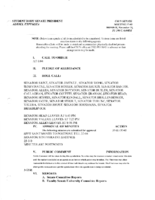Search the Special Collections and Archives Portal
Search Results

Lucela M. Wattin oral history interview: transcript
Date
Archival Collection
Description
Oral history interview with Lucela M. Wattin conducted by Stefani Evans on December 6, 2021 for Reflections: The Las Vegas Asian American and Pacific Islander Oral History Project. Lucela shares memories of her life growing up in Cebu Province, Philippines and being raised by her mother and grandparents after her father's death. She talks about immigrating to the United States under her fiancée's visa, moving to Chinatown in Las Vegas, and her work as a busser at the Excalibur Hotel. Lucela discusses how joining the Culinary Workers Union improved her work conditions and benefits, and how she is working with the union and a legal attorney to help her daughter immigrate to America. She also shares her favorite Filipino dishes (sinagang, chicken adobo, and bugas mais), holiday traditions, and what life was like when casinos shut down during COVID-19.
Text

Erma Linda Rivera oral history interview: transcript
Date
Archival Collection
Description
Oral history interview with Erma Linda Rivera conducted by Laurents Bañuelos-Benitez, Nathalie Martinez, Maribel Estrada Calderón, and Barbara Tabach on January 09, 2019 for the Latinx Voices of Southern Nevada Oral History Project. In this interview, Erma Linda Rivera discusses her early life as a grandchild of immigrants. She shares her experiences growing up in a mining town in Arizona. After marrying, both Erma Linda and her husband Jose became federal civil servants. This would lead Erma Linda Rivera to Las Vegas, Nevada in 1984. Prior to retirement, Rivera worked as an regional Equal Employment Opportunity manager. Rivera discusses her career working for the Department of the Interior, sharing how her job helped fuel her passion for social justice. Erma Linda relates the importance of civic involvement in her life. Finally, she reflects on how Henderson, Nevada has changed over the years she has lived there.
Text

Andrew Walsh oral history interview: transcript
Date
Archival Collection
Description
Oral history interview with Andrew Walsh conducted by Barbara Tabach and Claytee D. White on February 13, 2019 for the Remembering 1 October Oral History Project. In this interview, Walsh recalls his early life in New York City, New York, and working for the New York Police Department. He then recalls moving and joining the Las Vegas Metropolitan Police Department in 1998. He discusses his current position as Deputy Chief/Division Commander of Tourist Safety, his role in the aftermath of the October 1, 2017 mass shooting at the Route 91 Harvest Festival, and community healing.
Text

Transcript of interview with Phillip L. Cook by Richrad Strahan, March 3, 1977
Date
Archival Collection
Description
On March 3, 1977, Richard Strahan interviewed Phillip L. Cook (born 1939 in Las Vegas, Nevada) about his life in Southern Nevada. Cook first talks about his parents’ move to Nevada and then describes how the school system has changed over time. He then describes the first businesses that opened up in the Downtown and Strip areas in Las Vegas before discussing prostitution, Block 16, and recreational activities available to youth. Cook also talks about the first television sets and telephone systems made available, and he moves on to talk about the prices of things such as movies and haircuts when he was younger. The interview then moves to discussions on the Old Ranch, racial discrimination, school integration, the crime rate, and the school system in Las Vegas.
Text

Transcript of interview with Marguerite Goldstein by Carol A. Semendoff, February 25, 1979
Date
Archival Collection
Description
On February 25 1979, collector, Carol A. Semendoff interviewed cashier, Marguerite Goldstein, (born on May 1925 in Oberlin, Kansas) in the library at the University of Nevada, Las Vegas. This interview covers early Las Vegas, from 1950 to 1979. Also included during this interview is discussion on local dignitaries, the growth of Las Vegas, gambling as the major industry in Las Vegas, Strip hotels, and housing developments.
Text

James Matson interview, February 23, 1980: transcript
Date
Archival Collection
Description
On February 23, 1980, Ken Rose interviewed James Matson (b. July 14, 1923 in Pensacola, Florida) about his life in Las Vegas, Nevada. Throughout the interview, Matson discusses his childhood, life in Florida before moving to Las Vegas, his family and what brought him to Las Vegas. Matson also delves into his economic struggles and those of the community, his attempt to purchase a home and the changes he would like to see in society. Moreover, Matson talks about his hobbies, his work in construction and interracial friendships. The interview ends with Matson discussing the city of Las Vegas, the weather and the changing buildings.
Text

Meeting minutes for Consolidated Student Senate University of Nevada, Las Vegas, May 9, 1985
Date
Archival Collection
Description
Text

Meeting minutes for Consolidated Student Senate University of Nevada, Las Vegas, March 9, 1989
Date
Archival Collection
Description
Text

Meeting minutes for Consolidated Student Senate, University of Nevada, Las Vegas, February 25, 2008
Date
Archival Collection
Description
Text

Meeting minutes for Consolidated Student Senate, University of Nevada, Las Vegas, November 13, 2006
Date
Archival Collection
Description
Text
